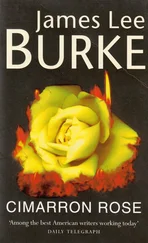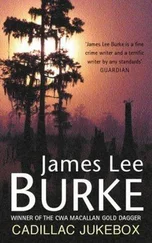"Sorry for the remark outside," Helen said, her eyes deliberately unfocused as she looked down at the shape curled inside the well.
"Is that Remeta?" Magelli asked.
There was little left of the dead man's features. The head was hairless, the skin burned black. His forearms were pressed against his ears, as though the flames had contained a sound he did not want to hear. The tissue around his right eye looked like a scorched and shriveled biscuit.
"He was a geek. I was wrong about him," I said.
Magelli raised his eyes to mine, not understanding.
"It's Micah, Jim Gable's chauffeur. He used to be a carnival geek. He told me people paid to see the deformity on his face so they wouldn't have to look at the ugliness inside themselves."
"So?" Magelli said.
"He was a carnie man. He knew better than to shake down a man like Remeta. He was sent here to kill him," I said.
"You're saying Gable hired him?" Magelli said.
"A cop who had a whole family capped? Not a chance. I can't believe I was a meter maid here," Helen said.
THE NEXT MORNING I called Clete's motel but no one answered. I tried again later and a woman picked up the phone.
"Passion?" I said.
"What you want?"
"Where's Clete?"
"Asleep. Leave him alone."
"How about a little show of manners?" I said.
"I'll tell him you called. Right now he needs his rest," she said, and hung up.
That evening I drove to the motel. It had been hot all day, and the sky was purple and red in the west and it had just started to rain. When Clete opened the door his clothes looked like they had been slept in and I could smell alcohol deep down in his lungs.
"What's up, Streak?" he said.
"Did Passion tell you I called?"
"She must have forgot."
He closed the door behind me. The room was dark and in disarray. A red bandanna, like the one I had seen Passion wear around her neck, was on the nightstand.
He took an open can of beer out of the icebox and drank the can empty and dropped it in a trash basket.
"Jim Gable's chauffeur tried to hit Remeta. Remeta put one in him and then set his own apartment on fire," I said. I looked at the side of his face, his gaze that was focused on nothing. "Clete?"
"Remeta wanted everybody to think the chauffeur was him?"
"Or to buy time till he could find Gable and cook his hash."
"Gable set up the hit, huh?"
"That's my guess."
He turned on the tap in the sink and washed his face with his hands. "I'm out of hooch. I've got to get a drink," he said.
"I thought you were breaking it off with Passion."
"She's all alone. Her sister's going to be executed. She's got an incurable disease. What am I supposed to say? You were a good punch but hit the road?"
Then he started opening and closing cabinets, rooting in his suitcase, reopening the icebox, even though he already knew there was no more booze in the cottage.
"Passion wants me to go with her to Letty's execution. She got Letty to put my name on the list," he said. "You ever see the Stake in Saigon? I'm not up to this bullshit."
He waved one meaty hand in the air, as though warning away an imaginary adversary. I sat down on the side of his bed and waited for his anger to pass. Then my gaze alighted on one of the pillows by the headboard.
"Who was bleeding?" I asked.
"Go home, Dave. Let me alone for a while. I'll be all right. I promise," he said, and leaned heavily on the sink, his back swelling with breath like a beached whale's.
The next day I got another call from Connie Deshotel.
"I wasn't able to make any headway with Belmont," she said.
"I see."
"He's caught between his own inclinations and what his constituency wants. It's not easy for him," she said.
"His inclinations? I'll float that by Letty Labiche if I get a chance."
"I tried to help. I don't know what else you want."
"Where's Belmont now?"
"I wouldn't know. Try his office. But I'm out of this. You understand? Frankly, I just don't want any more of your rudeness," she said.
"What's your relationship with Jim Gable, Connie?" I said.
But the connection had already gone dead.
Connie Deshotel had said she didn't know Belmont Pugh's whereabouts. But today was Wednesday, and I knew where to find him. When Belmont had been a traveling preacher and broom salesman, he had made a regular midweek stop at a slat-board fundamentalist church outside the little settlement of Lottie, in the middle of the Atchafalaya Basin. The congregation had paid thirty-five dollars for every sermon Belmont gave, and today, either out of gratitude or the aura of humility his continued presence at the church brought him, Belmont was still a regular at Wednesday night meetings.
That evening I drove up through Opelousas and took Highway 190 toward Baton Rouge, then turned down a shale road and crossed a railroad track and went deeper into the Basin, past a community of small houses with rusted screens, to a church building with a blue neon cross on the roof.
The congregation had laid out dinner on plank tables by a grove of cedar trees. Among the cluster of pickup trucks and 1970s gas-guzzlers I saw Belmont 's black Chrysler, a patina of gray mud on the fenders.
The windows were down in the Chrysler, and when I walked past it I could see a bored state trooper behind the wheel and a woman in back who was smoking a cigarette. She looked like she had been reconstructed in Dr. Frankenstein's laboratory, with silicone implants, a face tuck, chemically dyed skin, and industrial-strength perfume. She blew her nose on a Kleenex and dropped it out the window on the grass.
Belmont 's mouth was full of food, his Stetson pushed back on his head so that the ends of his hair were mashed against his forehead like a little boy's.
"You're not gonna punch nobody out, are you, son?" he said.
"I need to talk with you about Letty Labiche."
"I knew it."
"She's got two weeks."
"You don't need to remind me of that. I got people marching with signs in front of the capitol. I got Italians calling me from the Vatican."
"You don't want this on your conscience, Belmont."
He tossed a chicken bone over his shoulder and got up from the table.
"Walk with me," he said.
We went into the grove of cedars; the sky was purple now and filled with the drone of locusts. There was grease on his hands, and he kept opening and closing them and looking at the shine the grease made on his skin.
"I'll be right by the phone the night the death warrant is read. I get new evidence or hear from the federal court, I'll stop it. Otherwise, it goes forward," he said.
"It's wrong. You know it."
"I'm the governor. Not a judge. Not a jury. I didn't have a damn thing to do with that trial. It's on y'all's self, right down there in Iberia Parish. You quit carrying your guilt up to Baton Rouge and throwing it on my doorstep, you hear?"
He turned away from me and let out his breath. The curls on the back of his neck moved like chicken feathers in the breeze. In the distance his black Chrysler was painted with a red light against the western sun. Someone inside the church turned on the neon cross.
"Who's the lady in the car?" I asked.
"She's a missionary, as in 'missionary position.' I'm a sinner. I don't hide it. You stop climbing my back, Dave."
"Connie Deshotel warned me."
"What?"
"She said she didn't get anywhere with you. I don't know why I thought I could."
"It's Connie Deshotel been telling me Letty Labiche takes the needle or I go back to selling brooms and bathroom disinfectant. Where in God's name do you get your information, son?"
He walked back to the picnic and stopped by a water spigot. He turned it on and washed his hands, scrubbing them in the spray as though an obscene presence had worked its way into the grain of his skin. Then he pulled at least three feet of paper towel off a roll and wiped his hands and forearms and mouth and wadded up the paper and bounced it off the side of a trash barrel. His Stetson hat had turned a soft blue in the glow of the neon cross on the church.
Читать дальше












